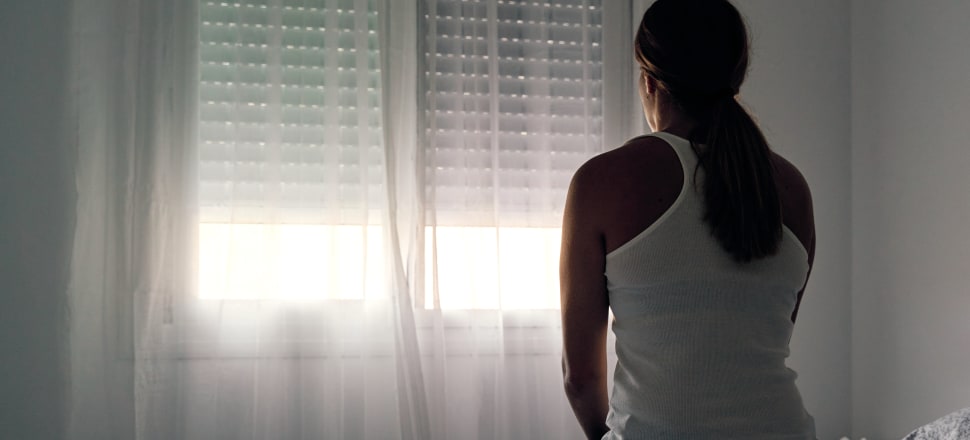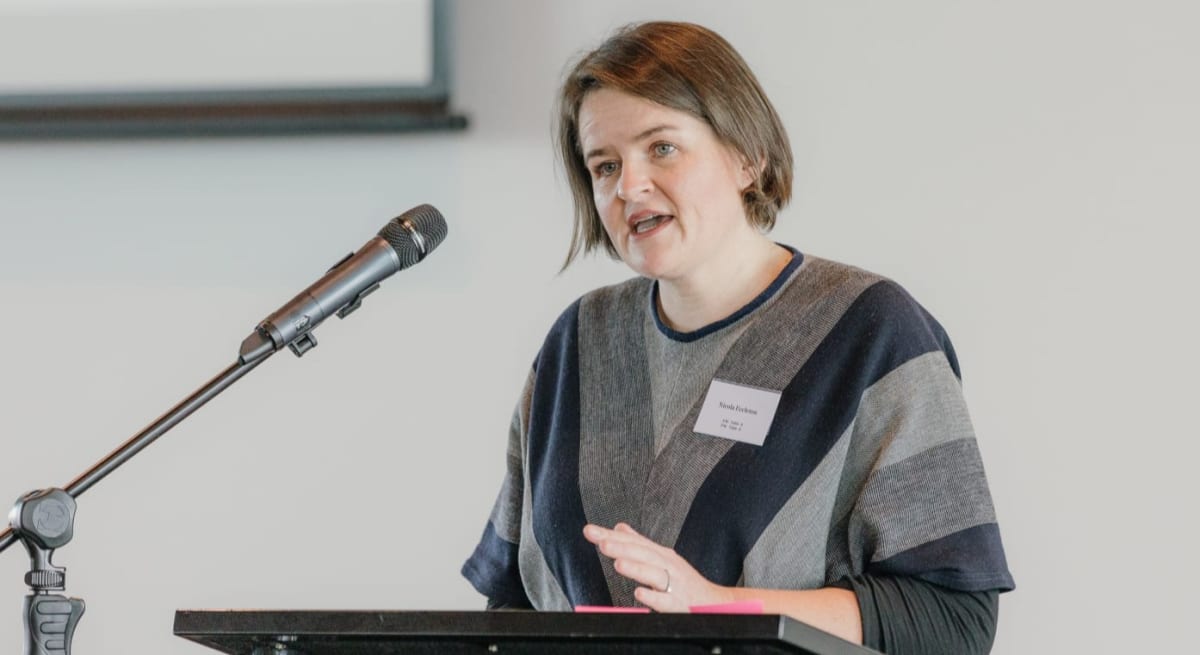
- Warning: This article contains descriptions of domestic violence that will be upsetting for some readers.
Parliament is urged to make an immediate law change to protect those who suffer economic abuse in relationships
She is a health professional, a mother of three who has close friends and family who love her. She never imagined she would suffer physical and economic abuse at the hands of her partner.
This woman spoke with Newsroom about the violence she experienced that culminated in him smashing her in the head in a public place in front of more than a dozen witnesses. Sadly, her story is not unusual.
'“We left everything behind but leaving was only the start of my journey,” she says. “I had a serious concussion from the beating, a bad credit history and $15,000 debt that we both incurred, which I was left to deal with on my own.”
Police, the justice system and social support agencies have got better at responding to physical violence in the home, but New Zealand still lags in its failure to legally acknowledge debilitating economic abuse.
This week, the woman is meeting with Marama Davidson, the Minister for the Prevention of Family Violence, to talk to her about the extent of the problem.
Good Shepherd, a not-for-profit organisation that has been assisting the survivor and others experiencing financial exclusion, is calling for an immediate law change to recognise economic abuse as its own form of violence.
“Economic abuse is a serious problem, and it’s often hidden." – Roger Beaumont, Bankers' Association
It’s backed by the Bankers’ Association.
“Economic abuse is a serious problem, and it’s often hidden,” says chief executive Roger Beaumont.
Banks and Good Shepherd tell of abusers emptying the bank accounts; of welching on shared debts; of using the reference field in automatic payments to make threats.
“These cases are often very sensitive and complicated by the bank’s customer obligations to both domestic partners who may have joint accounts, home loans and credit cards,” Beaumont says. “Joint products usually need the consent of both customers to make any changes. Issues can arise when one party refuses consent.”
'Everything linked to money was hard'
The woman, in her 30s, looks straight ahead as she tells her story. It’s not been easy for her to come forward. Newsroom is protecting her identity to reduce any risk to her, and to her family.
She’s a professional who loves her work. She’s a “great mum” – a description repeated by the friend who is supporting her.
She was so impressed by a school dental nurse who looked after her oldest daughter when she was little, that she decided to train in health work too. "I did the hard yards. I started volunteering, and then observing and then I managed to do some training, and then it turned into employment."
She met the man, they moved in together and had a baby daughter. She got a job with the local district health board. But in the months and years that followed, he became violent. She was the only one working, but she had to conceal her injuries when she went into the clinic.
Her wage wasn’t enough to cover the rent and bills and groceries. He had a bad credit record so, as their financial position worsened, he urged her to take out a loan from the bank, and then another from a finance company. "He was a quick fix person. Whereas I had come from a different background of working hard, and having a goal, and achieving it."
“When the bank wiped the debt, I just cried! It didn’t seem real. It halved my debt problem and I could finally begin to see the end – free from everything that tied me to this old relationship.”
The interest payments mounted, and she was forced to borrow money from friends and family. Soon they owed $15,000.
The abuse, physical and economic, worsened. Police were called again and again. He would stop her from leaving the house, even when her son hurt himself at school and was taken to hospital. She was forced to take more and more time off work, trying to hide her injuries.
Last year, the night he beat her in public, causing serious concussion, the police finally removed her and the children from the house.
She fled to the nearest big city, where she got medical attention. She and her two younger children were given a room in a Women’s Refuge. "This is still fresh. And when I fled, as shit as the situation was, in my head I gave myself a year to have a clear understanding of where life was going to be."
She kept a notebook of all her calls to banks, insurers, the Ministry of Social Development – 40 different people and organisations, in total. Just about every time she dealt with the ministry, she'd spent more than an hour waiting on the phone, or a day waiting for a callback – and then have to tell her story again to a new person, who hadn't read her notes.
Even though she was in hiding with a protection order against her ex-partner, the response from lenders and utility companies was always the same. Her name was on the debts and accounts, so she was liable for them. Unless she could persuade her abuser to take responsibility for his share of the debt, she was on her own.
“Everything linked to money was hard, really hard,” she says. “I was always on the end of the phone asking to delay payments or set up to make new arrangements because of my situation – but I wasn’t allowed without incurring more fees.
“For instance, I rang the debt collection agency to make arrangements for the parking ticket I had and my first problem was my address. I had to use someone else’s also explaining I was in Refuge.”
“This is what freedom looks like for me – living within our means, no longer relying on other people or organisations and making my own decisions.”
She and her children stayed with Women’s Refuge for six months. Eventually she found a rental home for her and her children in the city, but her credit record was in tatters. “I had to have guarantors for my power, for my water,” she says. “My record wasn’t good enough for them because of my credit history and I didn’t have the couple of hundred dollars they wanted in bond either.”
Eventually she found a voluntary financial mentor, who put her in touch with Good Shepherd NZ. “I finally had support to deal with the money side of things and I wasn’t fighting on my own.”
The Good Shepherd worker, Vanessa, was appalled to discover the bank wanted her to dip into her KiwiSaver to repay a $6,000 bank loan. She argued the woman’s case and, abashed, the bank acknowledged she should not be liable for the money taken out under her name. The debt was written off.
“When the bank wiped the debt, I just cried! It didn’t seem real. It halved my debt problem and I could finally begin to see the end – free from everything that tied me to this old relationship.”
She got a new job, in private practice, and with it recovered some of the self-worth that her professional work gave her. In less than a year, she has paid off the rest of her debts to the finance company and friends and family.
“This is what freedom looks like for me – living within our means, no longer relying on other people or organisations and making my own decisions.”
Proceeds of crime
Good Shepherd's Nicola Eccleton says New Zealand can’t eliminate family violence if it doesn’t address the economic and financial impact. She is leading calls for an immediate law change.
Eccleton, the organisation's head of impact, says New Zealand must do better.
In the Family Violence Act, any economic violence is subsumed under the broad and subjective term, psychological abuse. But if New Zealand were to follow the lead of the the UK and all eight Australian states and territories, then economic abuse would be legally recognised and prohibited.
“People are facing the choice between violence and poverty.” – Nicola Eccleton, Good Shepherd NZ
Financial and economic economic harm creates long-lasting financial hardship, Eccleton says, as well as barriers that prevent people from leaving physically and sexually violent relationships.
Recent research in Australia found that nearly a quarter of people end up going back to an abusive relationship because of a lack of financial security.
“People are facing the choice between violence and poverty,” says Eccleton.

Good Shepherd is watching with interest the statutory recognition of economic violence as a crime in the UK, she says. At the very least, economic harm requires an economic remedy.
UK research recommends aligning domestic violence offences with their Proceeds of Crime Act. "We believe we have a moral obligation to provide compensation for victims, and this provides the mechanism to do so – this approach should absolutely be explored in New Zealand.”
Good Shepherd has conducted a six-month economic harm support service pilot. The interim report recommends:
- Clear guidelines on protection orders, and how to respond to them when dealing with clients with shared debts or accounts;
- Liability limits on joint debts in cases of family violence, or waiving them entirely where the victim was coerced to take out a loan;
- Financial support to recover from the impacts of family violence;
- Parliament should designate economic and financial abuse as its own form of violence, alongside psychological, physical and sexual abuse.
It is not just for government to fix the problem, she adds.
There are hopes that credit ratings companies may reduce five-year penal periods for loans defaulters. Banks, creditors, government, and community agencies all have a role to play when clients and customers are experiencing violence.
“Banks play a part in helping to identify instances of economic harm. They train staff to recognise signs of potential economic harm while being sensitive to customers’ situations and wishes." – Roger Beaumont
Already, more than 3,000 people working in financial services, health and the community sector have attended presentations to learn more about supporting clients suffering economic harm. Several banks and insurers – BNZ, Suncorp, ASB and Westpac – are already addressing the role they play in facilitating it.
Roger Beaumont says banks are working to help customers experiencing economic abuse, regardless of their personal circumstances or background.
“Banks play a part in helping to identify instances of economic harm. They train staff to recognise signs of potential economic harm while being sensitive to customers’ situations and wishes," he says.
Depending on the circumstances involved, banks can also offer help to customers experiencing economic abuse. That may be through helping to close joint accounts and looking at ways to manage joint debt. They may also be able to communicate with the other party where protection orders are in place."
It took a while, but the healthcare worker got her bank loan wiped, and is overjoyed to be back working in her profession.
"In the last couple of months, I feel like I've done a 360, back to where I was before the relationship. Back in a job that I love. It's great with the kids. And maybe I can speak out and hopefully help other women."







